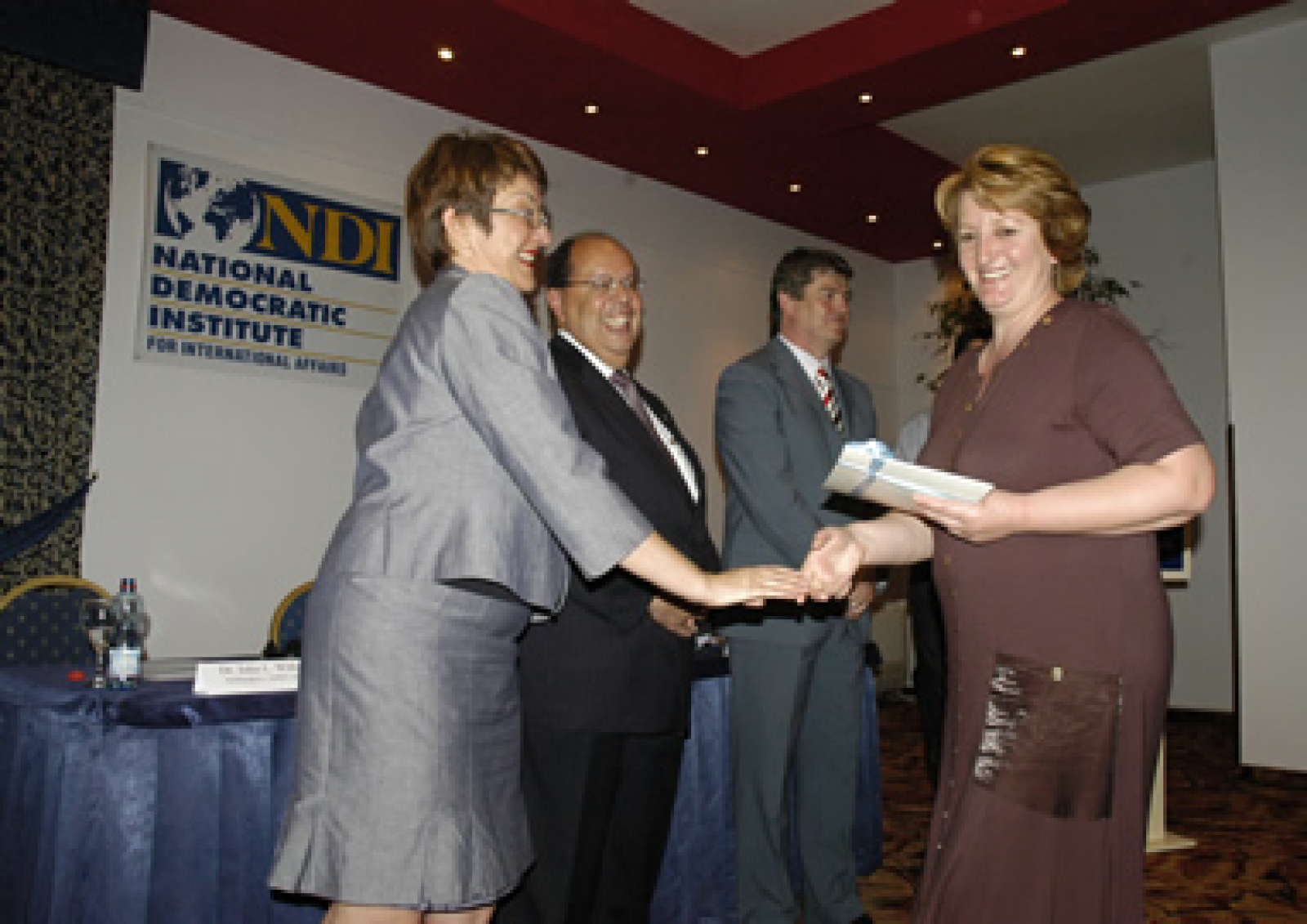
SHARE
Albanian President Bamir Topi, speaking to graduates of NDI’s women political development program, urged women across the country to assert their voices in public affairs. Albania has one of the lowest percentages of elected women in Europe. They hold only 10 of the 140 seats in Albania’s parliament, and only one of the country’s 65 mayors is a woman.
The president was the keynote speaker at the May 26 graduation ceremony that recognized the achievements of a multi-partisan group of some 30 women who have taken part in the Institute’s political skills development program. The program is funded by the National Endowment for Democracy and has run since 2007.
NDI’s seminars have focused on helping the participants become candidates or campaign managers for parliamentary elections taking place June 28. Albania is holding the elections under an electoral code passed last December that requires that 30 percent of the candidates on party lists be women. This provision came about through the advocacy efforts of NDI program participants, who picked up on the idea during an NDI study visit to neighboring Kosovo.
Prior to the elections, Sasha Pajevic, NDI’s director in Albania, was featured in Panorama, a daily national newspaper in Albania. Pajevic spoke about the Developing New Political Leaders program and the future of women in Albanian politics.
- Read the original interview as it appeared in Albanian, or the English translation.
Increasing the presence of women in Albania’s political life is seen as critical to its political stability, democratic development, economic growth, and EU membership prospects. Albania hopes to become an official EU candidate later this year. The country officially joined NATO in April. NDI led a study visit to Slovenia in May so that women in the program could see the political and legislative advancements made by women in a new EU member state.
The number of women in the new parliament is expected to increase. Twenty alumnae of NDI’s program are standing as candidates on their respective parties’ list; seven are in one of the top three spots. Under Albania’s new district-based, proportional system, the percentage of the vote that each party receives in each of the country’s 12 regions determines how many of its candidates are elected, starting with the names at the top.
Also attending the event, U.S. Ambassador to Albania John L. Withers II echoed President Topi’s message. Citing female participation as essential to Albania’s development, Withers defined the graduates as trailblazers who will be viewed by future generations as those “who led the way, who had not been satisfied, who have determined to make that role of women more powerful, more equal.”
The women in the NDI program formed strong bonds across often polarized party lines. They have created Equality in Decision Making, a nongovernmental network, to raise public awareness of the need for greater political participation by women, push for a stronger women’s presence in political parties and elected office, and support economic, social, and educational projects that benefit women at the community level. On April 15, with funding from the U.S. Embassy in Albania, the network held a ceremony for the Albanian political community to introduce the organization and highlight its mission and projects.
Two members of parliament, Lajla Pernaska of the Republican Party and Diana Çuli of the Social Democratic Party, spoke at the ceremony in support of the organization and its advocacy efforts. Representatives of the diplomatic corps, officials of major political parties, and civil society representatives attended the event, which launched the network’s campaign to raise awareness about the importance of women working together to increase their political role, and the barriers they face in pursuing leadership positions.
Two members of the women’s network, Mimoza Hajdarmataj and Violeta Sinoimeraj, appeared on the Albanian television program “Jo Vetem Kafe.” Sinoimeraj underscored the network’s message about the role of women in society. “The purpose of Equality in Decision Making is absolutely not to discriminate men but to respect a basic right of women,” she said. “In a democracy, one can govern through the people and for the people – and we cannot deny the rights of half of the people. I do not think that Albania has the luxury of leaving women outside the realm of decision-making and politics.”
Pictured above: NDI’s Albania Director Sasha Pajevic (from left to right), U.S. Ambassador John L. Withers II, and Albanian President Bamir Topi present a certificate of graduation to a participant of the Institute’s program to build political skills among women in Albania.
–
Updated on July 21, 2009
Video: Watch Mimoza Hajdarmataj and Violeta Sinoimeraj, the two members of Equality in Decision Making who discussed their recently established women’s network on the Albanian television program Jo Vetem Kafe.
Part One
Part Two
Part Three


